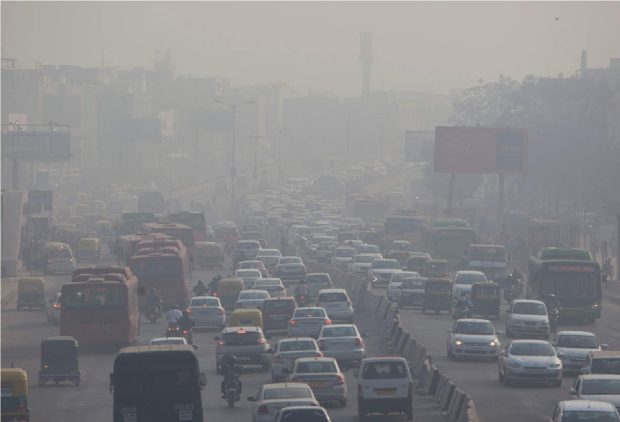
Air pollution and genes may elevate risk of depression: Study
PTI, Nov 9, 2021, 12:31 PM IST

Exposure to high-particulate-matter air pollution may significantly increase the risk of depression in healthy people who have a genetic predisposition for the disorder, according to a first-of-its-kind study.
The research, published on Monday in the journal PNAS, combined scientific data on air pollution, neuroimaging, brain gene expression, and additional data gathered from an international genetic consortium from over 40 countries.
”The key message in this study, which has not been shown before, is that air pollution is affecting important cognitive and emotional circuitry of the brain by changing the expression of genes that are conducive to depression,” said Hao Yang Tan from the Lieber Institute for Brain Development (LIBD) in the US.
”More people in high-pollution areas will become depressed because their genes and pollution in their environment exaggerate the individual effects of each,” said Tan, who led the research in collaboration with Peking University, China.
The researchers noted that all people have some propensity for developing depression, but certain people have higher risk written into their genes.
This predisposition does not mean that a person will develop depression, but it increases a person’s risk above the average population, they said.
The study shows that depression is far more likely to develop in otherwise healthy humans who have these key genes and who live in environments with high levels of particulate-matter in the air.
”Our results are the first to show a direct, neurological link between air pollution and how the brain works in processing emotional and cognitive information and in risk for depression,” said Zhi Li, a postdoctoral fellow at the LIBD, and lead author of the study.
”What is most intriguing is that the two factors are linked in such a way that they have a multiplier effect on one’s risk of depression. That is, together, risk genes and bad air raise the risk of depression much more than either factor does in isolation,” Li said.
The brain circuits involved in the effects of genetic risk and air pollution control a wide range of important reasoning, problem-solving, and emotional functions, suggesting potentially widespread brain effects of air pollution, the researchers said.
The study recruited 352 healthy adults living in Beijing, a city with well-documented daily pollution levels.
Participants first underwent genotyping from which the researchers calculated each person’s polygenic depression risk score — the mathematical likelihood that a person will suffer depression based on genes alone.
They then collected detailed information about each participant’s relative exposure to air pollution over a prior six-month period.
The participants then engaged in a series of simple cognitive tests while undergoing functional magnetic resonance imaging (fMRI) showing which parts of the brain were activated during the cognitive processing.
They were also subjected to social stress, which affected how a widespread network of brain circuits operated during the tests.
The researchers showed that this brain network was disproportionately degraded by the combination of the genes for depression and the relative degree of exposure to air pollution.
To directly examine how genes for depression operated in the human brain, they examined data from a gene atlas of postmortem human brain tissue.
The researchers then mapped the postmortem brain networks to the very same networks in living subjects to test whether those genes underwrite the effects of air pollution.
The team found that people who had high genetic risk for depression and high exposure to particulate matter had brain function predicted by a tighter integration with how genes for depression operated together.
The researchers also found that a subset of genes driving these associations were implicated in inflammation, as well — a finding that could provide new pharmacological insights into mitigating the effects of air pollution on brain function and depression.
Tan said that this new understanding has implications for policymakers around the world.
”Leaders and public health officials around the globe have ample evidence that additional air pollution controls will lead to improved cognitive function and lower rates of depression — particularly in densely populated urban areas where air pollution is highest, and stress from socioeconomic and racial inequities is greater,” Tan added.
Udayavani is now on Telegram. Click here to join our channel and stay updated with the latest news.
Top News

Related Articles More

Trump says India charges lot of tariff, threatens to impose reciprocal tax

Cyclone Chido hits French territory of Mayotte; Death toll is ‘several hundred,’ top official says

Sheikh Hasina mounts fresh attacks on Muhammad Yunus; accuses him of leading an “undemocratic group”

Tabla maestro Zakir Hussain in San Francisco ICU with heart problems

Ousted PM Sheikh Hasina involved in enforced disappearance: Bangladesh commission
MUST WATCH
Latest Additions

Tata Consumer Products denies reports on exit of Starbucks from India

Kashmir shivers ahead of ‘Chillai-Kalan’ , Srinagar records coldest night of season

We had to hide him, he’s his own enemy: MCA dismisses Shaw’s outburst over Vijay Hazare snub

Cong members put Ambedkar’s photos on their desks in Maharashtra assembly

Tata Power Renewable Energy partners with Canara Bank
Thanks for visiting Udayavani
You seem to have an Ad Blocker on.
To continue reading, please turn it off or whitelist Udayavani.





















